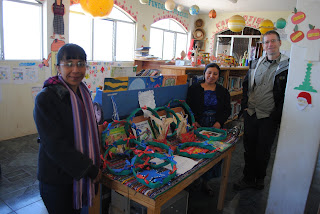
 John and I had a fabulous visit to the Riecken Library in Tatumbla, a rural community outside of the Honduran capitol city of Tegucigalpa. At this library we had the opportunity to meet several members of the Library Junta, a group of civic minded individuals that donate their time and money to the continuation of the community library.
John and I had a fabulous visit to the Riecken Library in Tatumbla, a rural community outside of the Honduran capitol city of Tegucigalpa. At this library we had the opportunity to meet several members of the Library Junta, a group of civic minded individuals that donate their time and money to the continuation of the community library. Upon arrival, John and I met with two members of the Junta, Rosaria Melendez, Vice-President, and Elena Elvir, Treasurer. We also met with the librarian, Ana Carolina Diaz, and community volunteer, Daysi Casco.
Upon arrival, John and I met with two members of the Junta, Rosaria Melendez, Vice-President, and Elena Elvir, Treasurer. We also met with the librarian, Ana Carolina Diaz, and community volunteer, Daysi Casco. 
The Tatumbla Library directs many projects and activities. One of the most interesting is El Barriltete Viajero, a project that circulates sport bags of books throughout the local schools (photo). Each bag contains an assortment of interesting children's books. The bags are kept circulating among the various schools, keeping a fresh reading selection for teachers and students.
(Photo: Beth, John, and the Treasurer of the Junta, Dona Elena Elvir)
The Library also hosts Actividades Generacionales, Adultos Mayores (activities for senior citizens); Artesonia (pottery and kiln skills); Curso de Corte y Confeccion (home skills class); Curso de Electricidad (electrical training); Curso de Computacion; and Hora de Cuenta (story hour). The building has a nice outdoor seating area where the municipality, teachers, cooperatives, and other community groups meet.
We were brought to Tatumbla by Francklin and Delin from the Riecken Office in Tegucigalpa. They brought along a donation from Fondo ACI-ERP, a bundle of creative art supplies to support manual activities that accompany a successful story hour. A wonderful collection of scissors, colored paper, glue, sparkles, and other materials. It was very much holiday appropriate!
On the other hand, the Tatumbla Library struggles in many ways. The Municipality was only able to pay for eight months of salaries and utilities this past year, The Junta contributed the funds for the other four months. Their computers are now six years old and run very slow. The situation demands that patrons pay a small fee for internet access. The Library used to emply an additional half-time librarian but no longer, now Ana runs the library alone with support from la Junta.
Many thanks to la Junta, Riecken staff, and library staff!
From left: John, Ana Carolina Diaz, Dasil Eloisa Mejia, Elena Elvir, Beth, Ana Carolina Diaz, Rosaria Melendez, and Dona Elvir's husband.


























